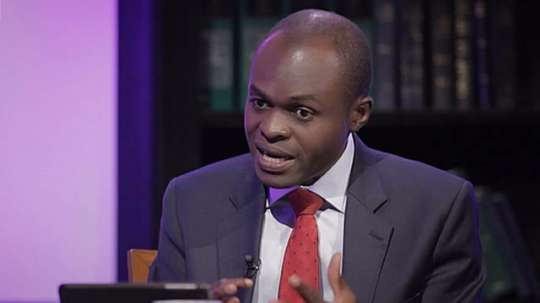A renowned Constitutional Lawyer and director at the Human Rights and Governance Centre, Martin Kpebu (Esq), has advised the Ghanaian state to adopt a “civil approach” in handling alleged ‘publications of false news and causing fear and alarm’ by media persons.
He said the frequent arrests and imprisonments of journalists send bad signals about Ghana.
Commenting on whether the recent arrests of Accra FM presenter Kwabena Bobbie Ansah “over an alleged publication of false news and offensive conduct” could have been handled as a civil matter rather than one involving the state, the renowned constitutional lawyer agreed the civil option should have been taken.
He noted that Ghana has a law directly on ‘publishing of false news and causing fear and alarm’ and the criminal aspect of it is found in Section 208 of Ghana’s Criminal Code, popularly referred to as ‘the law of causing fear and alarm’ which states that “where a person produces or reproduces a statement which is false in a manner that causes fear and alarm, and that statement is false, then that person has committed an offence – a misdemeanor, with a punishment between a fine and up to maximum of 3-year imprisonment”.
Lawyer Kpebu further explained that in a case of ‘causing fear and alarm’, “it must be established that the statement has been made, and, also, essentially communicated in a way that is to cause fear and alarm. Once this is established, we are in a realm of crime”.
On his take on the call for the case involving the Accra FM journalist to be treated as a civil one, lawyer Kpebu agreed that the police or the state should have explored the civil option because he “thought that was the whole idea behind the repeal of the Criminal Libel Law.”
In particular, he continued, “the sitting President, Nana Akufo-Addo, led a crusade for the repeal of the Criminal Libel Law.”
As he put it, “I thought due to the repeal of the Criminal Libel Law, we will be dealing with these matters in the civil realm.
“But, with Section 208 of the Criminal Code still operating, the repeal of the Criminal Libel Law has not done much because the value is still the same. You repealed one, but left another one which is causing the same effect.”
Mr Kpebu agreed with the Executive Director for Media Foundation for West Africa, Sulemana Brimah, a fellow panelist on the JOY News programme, that “state agencies are becoming too overbearing.”
He noted that there are bound to be excesses as “people, especially journalists, try to hold government accountable as a constitutional duty under Article 162 clause (5) of the Constitution of Ghana”.
He added that these excesses or mistakes are not peculiar to Ghana’s democracy because we are all fallible.
In his recommendations for civil options in addressing these matters in Ghana’s context, Mr Kpebu mentioned referral of such cases to the National Media Commission, a body that has sanctioned journalists in such matters in the past and caused erring journalists to retract stories and apologized.
“So, apart from going to court, there is the National Media Commission where some of these conducts can be reported to them to sanction journalists, cause them to retract stories, apologize and the rests.”
The human rights lawyer expressed worry that in a period of two weeks, there are over six such stories of arrests involving media persons.
Some of these include the arrests of Onua FM presenter, Captain Smart, who, though was granted bail before 11:00am, the National Security refused to go and check the abode of the sureties early enough so, they played ‘delay tactics’ because they wanted him to sleep in cells. The next one is Mensah Thomson, the Executive Director for ASEPA who (though not a journalist has been in a media space) was arrested and kept in custody over a story that may be false, but he is going to court over story that.
These are sending bad signals about Ghana, he said.
Source: Human Rights and Governance Centre, Accra-Ghana


